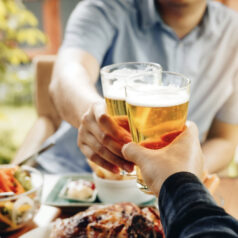
Alcohol is full of empty calories.
Empty calories are calories with few or no nutrients. They are calories from solid fats and/or added sugars and are mostly found in foods like soda, candy, donuts, fried foods, and yes, alcohol. When you eat these foods, you’re consuming calories that largely lead to weight gain and nutritional deficiencies.
Alcohol can lower a person’s inhibitions and often leads to over-indulging.
Impulse control has also been linked to alcohol consumption, driving people to behave differently than they typically would. Alcohol makes it more difficult to suppress impulses to binge eat, making it more difficult to say “no” to a second helping or passing on the last piece of pizza. One study found that AgRP neurons that are generally activated by starvation and cause incredible hunger are also activated by alcohol consumption.
Alcohol is tough on the digestive system.
A person’s stomach is the first place alcohol is broken down which causes changes to the stomach’s secretion of gastric acid. Alcohol can also interfere with gastric motility—the ability of your stomach muscles to break down the food you eat, as well as the ability for your body to absorb nutrients and vitamins. Alcohol is also known to irritate the small intestine which can cause abdominal bloating and diarrhea.
Alcohol can affect the quality of your sleep.
There is a strong link between sleep and weight loss, and while drinking alcohol may make you drowsy and potentially fall asleep faster, the actual quality of your sleep could be at risk. Studies show that alcohol consumption decreases the amount of REM sleep a person gets at night, making your sleep less restorative.
Alcohol and bariatric patients: Talk to your doctor to come up with a personalized plan.
